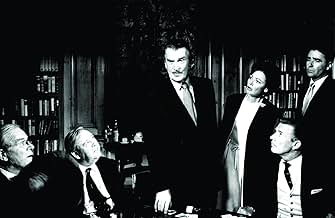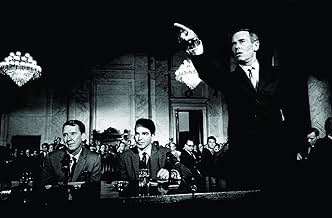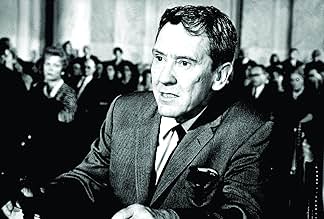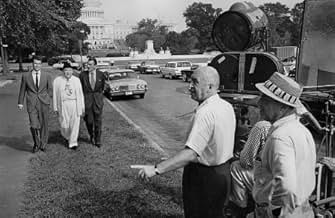VALUTAZIONE IMDb
7,7/10
7682
LA TUA VALUTAZIONE
Aggiungi una trama nella tua linguaThe polarizing search for a new Secretary of State has far-reaching consequences.The polarizing search for a new Secretary of State has far-reaching consequences.The polarizing search for a new Secretary of State has far-reaching consequences.
- Nominato ai 1 BAFTA Award
- 1 vittoria e 2 candidature totali
Trama
Lo sapevi?
- QuizDirector Otto Preminger offered the role of a Southern senator to Martin Luther King Jr., believing that the casting could have a positive impact (despite the fact that there were no black senators at the time). King declined after serious consideration, as he felt playing the role could cause hostility and hurt the civil rights movement.
- BlooperWhen the roll call vote is being conducted on the motion to advise and consent to Leffingwell's nomination, Senator Van Ackerman's name is not called. Even though he had left the Senate Chamber, the clerk would still have called his name.
- Citazioni
Johnny Leffingwell: The phone - Senator Munson.
Robert Leffingwell: Tell him I've gone out.
Johnny Leffingwell: Why?
Robert Leffingwell: Because, Johnny, he'll want to do some things that might obligate me.
Johnny Leffingwell: I mean why do you want me to lie? If you're in, you're in; if you're out, you're out.
Robert Leffingwell: Son, this is a Washington, D.C. kind of lie. It's when the other person knows you're lying, and also knows you *know* he knows. You follow?
- Versioni alternativeAlso available in a computer colorized version.
- ConnessioniFeatured in Henry Fonda: The Man and His Movies (1982)
- Colonne sonoreThe Song from Advise and Consent
Music by Jerry Fielding
Lyrics by Ned Washington
Sung Frank Sinatra - voice on juke box
Recensione in evidenza
As a Congressional correspondent for the New York Times during the 1950s, author Allen Drury had ample opportunity to witness Washington politicians in their natural habit---and drew upon numerous factual sources, including the controversial Alger Hiss case and the scandalous suicide of Senator Lester Hunt, to create the story of a controversial nominee for Secretary of State. The novel was not only a best seller, it was awarded the Pulitzer Prize.
It was also a book that Hollywood could not film under the film industry's notorious Production Code. As it happened, the book fell into the hands of director Otto Preminger, long-time foe of Hollywood's rules for self-censorship. He not only made the film, he flagrantly broke the code; as such, ADVISE AND CONSENT presents our nation's leaders embroiled in a blackmail plot, finds actress Gene Tierney using the word 'bitch,' and became the first Hollywood film to show a gay bar. It was shocking stuff for 1962.
The story is extremely convoluted. An aging and extremely ill President makes a highly controversial nomination for Secretary of State---which is opposed by a member of his own party, who bears the nominee a personal grudge and who attempts to derail the nomination by accusing the nominee of former membership in the Communist Party. This in turn touches off a vicious battle between those in the party who support the nominee and those who don't, a battle that will ultimately result in the suicide of the only character who has the integrity we would like to see in our political leaders.
The cast is indeed remarkable and, from Lew Ayres to Betty White, plays with considerable conviction and tremendous restraint. Henry Fonda is often cited as the star of the film, but in truth he appears in the small but pivotal role of Robert Leffingwell, nominee for Secretary of State. Screen time is divided between Walter Pigeon as the Majority Leader, Charles Laughton as the senator who opposes the nomination, and Don Murray, an idealist who finds himself chairing the nomination committee. All three play extremely well, but it is really Laughton---in his final screen role---who walks off with the film as the devious and openly vicious Senator from South Carolina. The trio is ably supported by a dream cast that includes Franchot Tone as the President, Lew Ayres as the Vice President, George Grizzard as a growling ideologue, Gene Tierney as a society hostess---and yes, Betty White, who offers a brief turn as the Senator from Kansas.
It has become fashionable to dismiss Otto Preminger films of the 1950s and 1960s as ponderous, all-star, and pseudo-intellectual trash, and indeed it is difficult to find much positive to say about films like EXODUS and HURRY SUNDOWN these days. But Preminger is in many ways under-rated; his films have not always dated well in terms of subject, but they hold up extremely well in the way in which they are put together, with ADVISE AND CONSENT a case in point---and it is worth pointing out that accusations of leftism, adultery, and homosexuality are still enough to prompt everything from impeachment to congressional hearings to resignations. Nor has the process of the political dance itself changed greatly between then and now.
The great flaw of the film is its conclusion, which seems facile to the point of being hokey---but this is also the great flaw of the novel, which ends in much the same way--and at times ADVISE AND CONSENT seems more than a little dry. All the same, it remains a movie worth watching, particularly notable for its performances, fluid camera work, and meticulous recreation of party politics. The DVD offers a near-pristine widescreen transfer with good sound quality and an interesting, if occasionally too academic, commentary by film historian Drew Casper. Recommended.
GFT, Amazon Reviewer
It was also a book that Hollywood could not film under the film industry's notorious Production Code. As it happened, the book fell into the hands of director Otto Preminger, long-time foe of Hollywood's rules for self-censorship. He not only made the film, he flagrantly broke the code; as such, ADVISE AND CONSENT presents our nation's leaders embroiled in a blackmail plot, finds actress Gene Tierney using the word 'bitch,' and became the first Hollywood film to show a gay bar. It was shocking stuff for 1962.
The story is extremely convoluted. An aging and extremely ill President makes a highly controversial nomination for Secretary of State---which is opposed by a member of his own party, who bears the nominee a personal grudge and who attempts to derail the nomination by accusing the nominee of former membership in the Communist Party. This in turn touches off a vicious battle between those in the party who support the nominee and those who don't, a battle that will ultimately result in the suicide of the only character who has the integrity we would like to see in our political leaders.
The cast is indeed remarkable and, from Lew Ayres to Betty White, plays with considerable conviction and tremendous restraint. Henry Fonda is often cited as the star of the film, but in truth he appears in the small but pivotal role of Robert Leffingwell, nominee for Secretary of State. Screen time is divided between Walter Pigeon as the Majority Leader, Charles Laughton as the senator who opposes the nomination, and Don Murray, an idealist who finds himself chairing the nomination committee. All three play extremely well, but it is really Laughton---in his final screen role---who walks off with the film as the devious and openly vicious Senator from South Carolina. The trio is ably supported by a dream cast that includes Franchot Tone as the President, Lew Ayres as the Vice President, George Grizzard as a growling ideologue, Gene Tierney as a society hostess---and yes, Betty White, who offers a brief turn as the Senator from Kansas.
It has become fashionable to dismiss Otto Preminger films of the 1950s and 1960s as ponderous, all-star, and pseudo-intellectual trash, and indeed it is difficult to find much positive to say about films like EXODUS and HURRY SUNDOWN these days. But Preminger is in many ways under-rated; his films have not always dated well in terms of subject, but they hold up extremely well in the way in which they are put together, with ADVISE AND CONSENT a case in point---and it is worth pointing out that accusations of leftism, adultery, and homosexuality are still enough to prompt everything from impeachment to congressional hearings to resignations. Nor has the process of the political dance itself changed greatly between then and now.
The great flaw of the film is its conclusion, which seems facile to the point of being hokey---but this is also the great flaw of the novel, which ends in much the same way--and at times ADVISE AND CONSENT seems more than a little dry. All the same, it remains a movie worth watching, particularly notable for its performances, fluid camera work, and meticulous recreation of party politics. The DVD offers a near-pristine widescreen transfer with good sound quality and an interesting, if occasionally too academic, commentary by film historian Drew Casper. Recommended.
GFT, Amazon Reviewer
I più visti
Accedi per valutare e creare un elenco di titoli salvati per ottenere consigli personalizzati
Dettagli
- Data di uscita
- Paese di origine
- Sito ufficiale
- Lingua
- Celebre anche come
- Advise & Consent
- Luoghi delle riprese
- Columbia/Sunset Gower Studios - 1438 N. Gower Street, Hollywood, Los Angeles, California, Stati Uniti(Studio, Senate Chamber - interiors)
- Aziende produttrici
- Vedi altri crediti dell’azienda su IMDbPro
- Tempo di esecuzione2 ore 19 minuti
- Colore
- Proporzioni
- 2.35 : 1
Contribuisci a questa pagina
Suggerisci una modifica o aggiungi i contenuti mancanti

Divario superiore
By what name was Tempesta su Washington (1962) officially released in India in English?
Rispondi





































